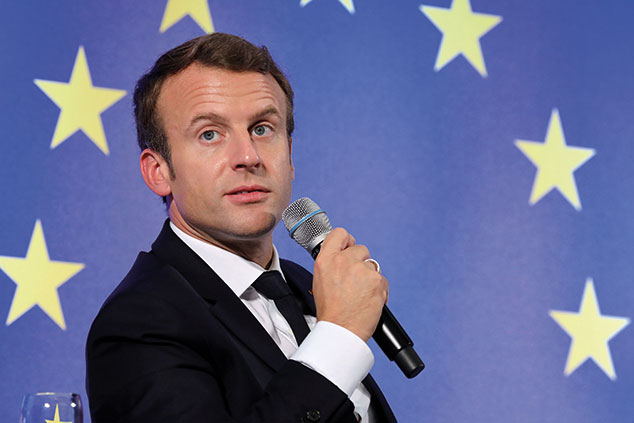
Eighteen months ago the French president “laid out a sweeping vision for a stronger EU”, only for it to be “greeted with a shrug by a German government”, say Ben Hall and Victor Mallet in the Financial Times. With European elections only weeks away, he has had another stab at it.
On Monday Emmanuel Macron published an “address to Europe”, proposing reforms to immigration, defence and trade to make a Europe that “better protects its citizens, companies and values”. His most radical proposals include a Europe-wide minimum wage and making membership of the Schengen area “conditional on acceptance of common asylum rules and procedures”, an EU border force and sharing the burden of refugee inflows.
A mixed reaction
The initial reaction from European leaders to Macron’s speech suggests he has his work cut out to build support among the other 27 member states, says Jan Strupczewski for Reuters. Indeed, many see his plan more as part of an attempt to boost his popularity ratings in France before the elections for the European Parliament in May than as a set of coherent proposals. Belgian leaders endorsed some of his specific ideas, but the Germans limited their reaction to “polite support” for “engaged discussions”. The Czech president has already called them “divorced from reality”.
The problem is that while Europe does need reform badly, Macron’s strategy of “dumping random new ingredients in the soup” is “at best quixotic and at worst harmful to the European cause”, says Bloomberg. If Macron wants to achieve anything worthwhile he should ditch his grand vision and focus on getting other major countries, such as Germany, to agree to “a unified set of realistic, solid proposals”.
Such joint proposals “would show centrist voters what they should expect in return for their support”. As it is, Macron looks like he is “throwing everything at the wall to see what will stick”, and risks “providing more ammunition for rival parties opposed to more European integration”.
What Brexit Britain will miss
Macron’s “impractical, overblown” vision of an “ever more united, integrated, regulated and collectivised Europe” is “strangely outdated” and “fated to founder”, says Simon Tisdall in The Guardian. Nor is it the kind of EU – if it ever came into being – that most Britons would want to be any part of. However, the idea is only being floated because Britain’s departure undermines support for those who want the EU to move in the direction of “a loosely aligned alliance of sovereign European states”. If Britain abandoned Brexit, it could once again “help to lead and win the battle for Europe”.
Macron may think that his “full-throated defence” of the EU will “show the British what they are missing”, says Asa Bennett in The Daily Telegraph. But Brexiteers “should be pleased” with his plan, “as it vindicates their decision to leave the bloc”. Macron’s obsession with “taking more power from voters in the name of the European ideal” is why “voters decided to leave”. “Brexiteers should thank him for being so blunt as he is constantly reminding them that they made the right choice.”